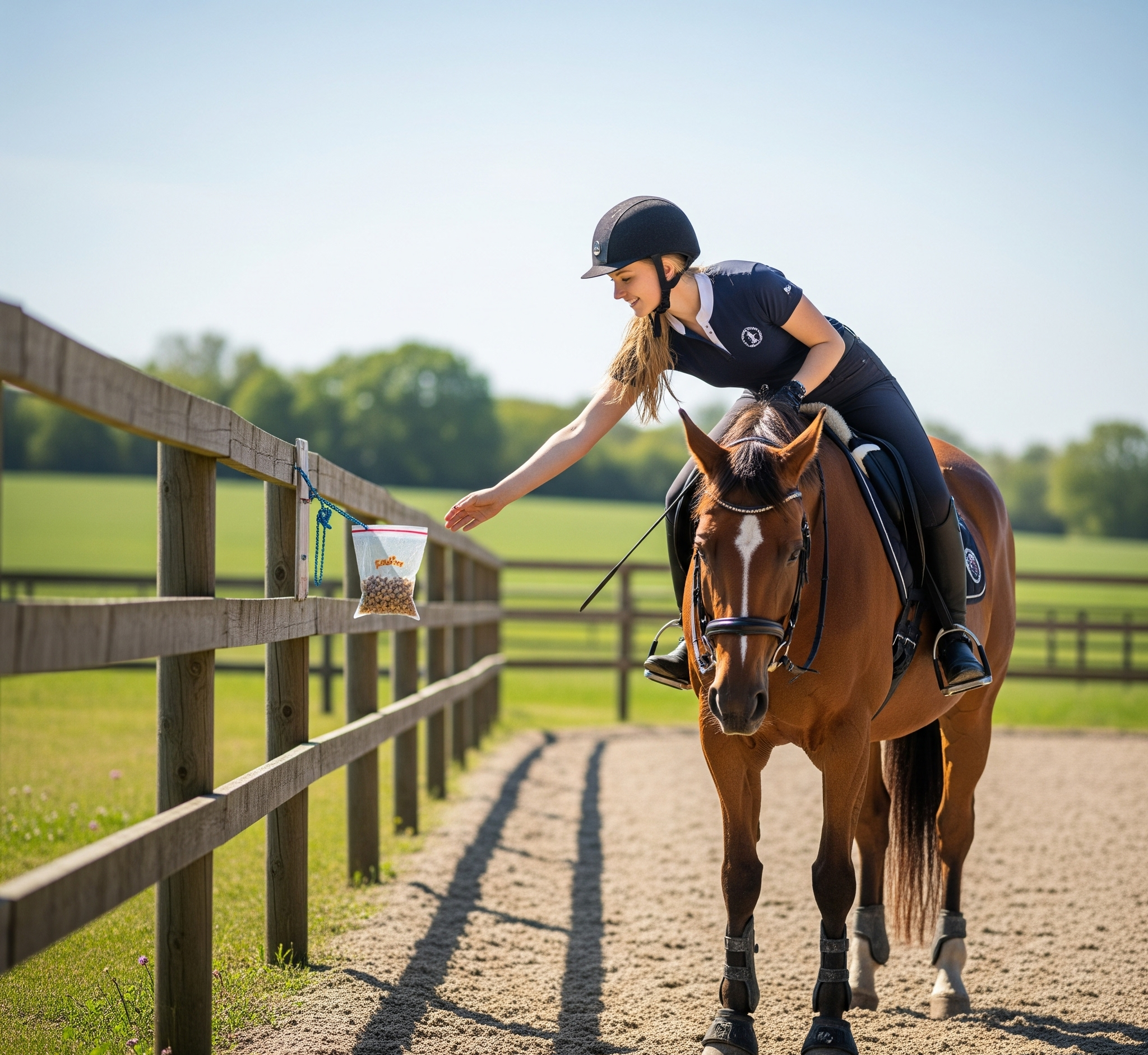
Treat Collection Steering Game: Building Navigation Skills Through Fun Challenges
This engaging steering exercise transforms precision riding practice into an exciting treasure hunt that develops accurate navigation, balance, and horse control while maintaining high levels of rider motivation and engagement.
Game Overview and Benefits
Primary Educational Objectives
Steering Precision Development: Riders practice accurate navigation to specific targets throughout the arena, building the fundamental control necessary for course riding and advanced equitation.
Balance and Coordination: Collecting treats from various heights and positions challenges rider stability while maintaining horse control and proper position.
Spatial Awareness Training: Navigating between multiple targets develops planning skills and arena awareness essential for group riding and competition preparation.
Universal Application
Multi-Level Effectiveness: This activity works successfully for all ages and experience levels, from young beginners building basic steering skills to adult riders refining precision and control.
Warm-Up Integration: Serves as an excellent lesson opener that establishes forward movement, responsiveness, and positive energy while building focus for subsequent training activities.
Motivation Enhancement: The treat collection element maintains high engagement levels while building essential riding skills through purposeful, goal-oriented activity.
Equipment and Setup Requirements
Essential Materials
Treat Options:
- Commercial Horse Treats: Consistent size and appeal for most horses
- Natural Alternatives: Carrots, apples, or sugar cubes (cut appropriately for safety)
- Homemade Options: Horse-safe oatmeal cookies or other approved treats
- Collection Equipment: One bucket or container per team for organized treat storage
Arena Setup Protocol
Strategic Treat Placement:Height Variation: Position treats at different levels to accommodate various rider abilities and create appropriate challenges.
Placement Locations:
- Eye Level: Standard difficulty for most participants
- Elevated Positions: Challenge advanced riders with upward reaching exercises
- Lower Placements: Accommodate shorter riders or provide specific balance training
- Secure Positioning: Use jump standards, fence posts, and arena fixtures that provide stable treat placement
Safety Considerations: Ensure all treat locations are easily accessible without creating hazards or requiring dangerous reaching or leaning.
Game Rules and Execution
Team Organization Options
Flexible Participation Formats:
- Individual Competition: Solo riders compete using one central collection bucket
- Pair Teams: Two riders collaborate to collect treats efficiently
- Small Group Teams: Three to four riders work together strategically
- Large Team Format: Divide bigger groups into competing teams
Gameplay Mechanics
Starting Protocol: Begin on instructor count with all participants starting simultaneously
Collection Process:
- Navigation: Rider steers horse to treat location
- Safe Collection: Maintain proper position while reaching for treat
- Deposit: Return to team bucket to deposit collected treat
- Continuation: Proceed to next treat location for additional collection
Winning Criteria: Team with most treats collected when all arena treats are gathered wins the competition
Critical Safety Guidelines
Position and Balance Requirements
Downward Reaching Safety: When reaching down for treats, riders must maintain weight in outside stirrup to prevent saddle slipping and maintain balance.
Proper Reaching Technique:
- Weight Distribution: Keep primary weight in outside stirrup when leaning
- Avoid Inside Support: Never use inside stirrup as leaning support
- Maintain Core: Engage core muscles to support reaching movements
- Quick Recovery: Return to centered position immediately after collection
Equipment and Environmental Safety
Bucket Positioning: Place collection buckets in safe locations where horses won't accidentally knock them over during navigation
Arena Management: Ensure adequate spacing between riders to prevent collisions or interference during collection activities
Horse Selection: Use calm, reliable horses that won't become overly excited by treat presence or competitive atmosphere
Progressive Variations and Challenges
Gait Modifications
Walk Foundation: Begin all participants at walk to establish control, safety, and proper collection technique before advancing
Trot Progression: Advance to trot collection for experienced riders when treats can be safely gathered at increased speed
Gait Selection: Allow riders to choose appropriate speeds based on comfort level and specific treat location challenges
Directional Restrictions
Lateral Training Challenges:Left-Side Only Collection: Restrict treat gathering to horse's left side only for focused skill development
Right-Side Only Collection: Practice collecting exclusively from right side to build ambidextrous reaching abilities
Alternating Requirements: Require alternating sides for each treat to build balanced coordination and planning skills
Advanced Challenge Options
Height-Specific Requirements: Assign specific riders to particular height levels based on ability and safety considerations
Sequence Challenges: Require treats to be collected in particular orders or patterns for added complexity
Time Limitations: Add appropriate time constraints while maintaining safety as primary consideration
Educational Integration and Assessment
Skill Development Monitoring
Steering Accuracy: Observe precision in navigation and approach to treat locations
Balance Maintenance: Assess rider stability and position quality during reaching and collection activities
Horse Control: Evaluate horse responsiveness and obedience during exciting or competitive situations
Post-Activity Learning Reinforcement
Horse Reward Integration: Reserve time after dismounting for riders to share collected treats with their horses, creating positive associations
Technique Discussion: Review proper reaching techniques and safety protocols while experiences are fresh
Performance Recognition: Acknowledge good sportsmanship, safety awareness, and skill improvement alongside competitive results
Program Integration Benefits
Lesson Planning Applications
Warm-Up Effectiveness: Establishes forward movement, steering responsiveness, and positive lesson energy
Skill Assessment Tool: Provides objective evaluation opportunities for rider steering, balance, and horse control
Motivation Maintenance: Breaks up routine training with engaging, purposeful activity that maintains enthusiasm
Cross-Training Value
Competition Preparation: Navigation skills and target accuracy transfer directly to jumping courses and pattern work
Trail Riding Applications: Precision steering and balance challenges support confident outdoor riding experiences
General Horsemanship: Overall control and coordination improvements benefit all riding applications and horse relationships
The treat collection steering game provides an engaging, educational activity that builds essential navigation skills while maintaining high motivation and positive experiences for both horses and riders. Through systematic implementation with appropriate safety protocols, this versatile exercise supports skill development across all riding levels while creating memorable, fun learning experiences that reinforce fundamental riding competencies.

Want More Lesson Plans?
Stop spending hours creating lesson plans from scratch! Our massive database gives you proven exercises for any rider, any discipline, any weather. Group lessons, private coaching, games, warm-ups - it's all here.
Get instant access to 1,000+ lesson plans →
